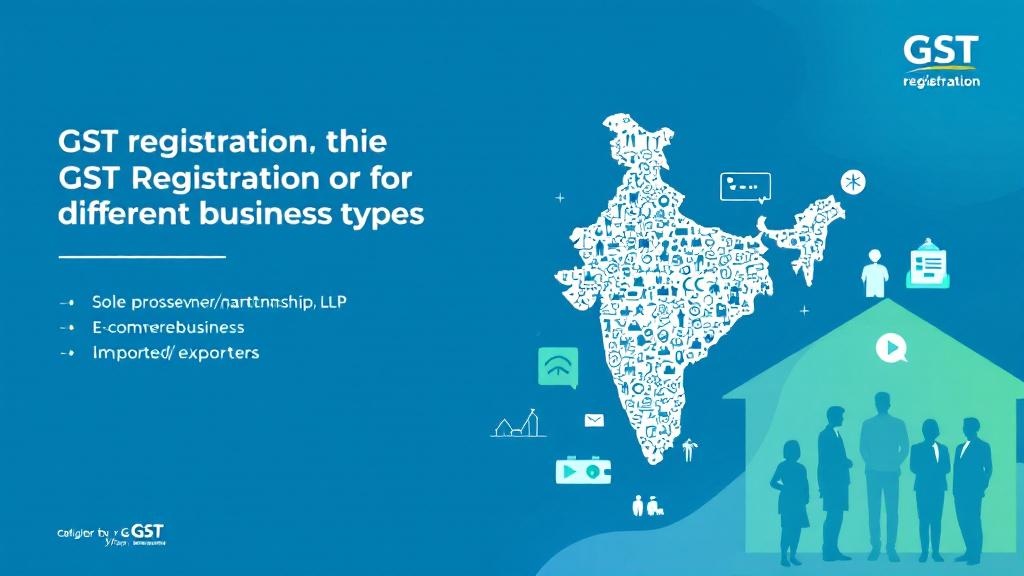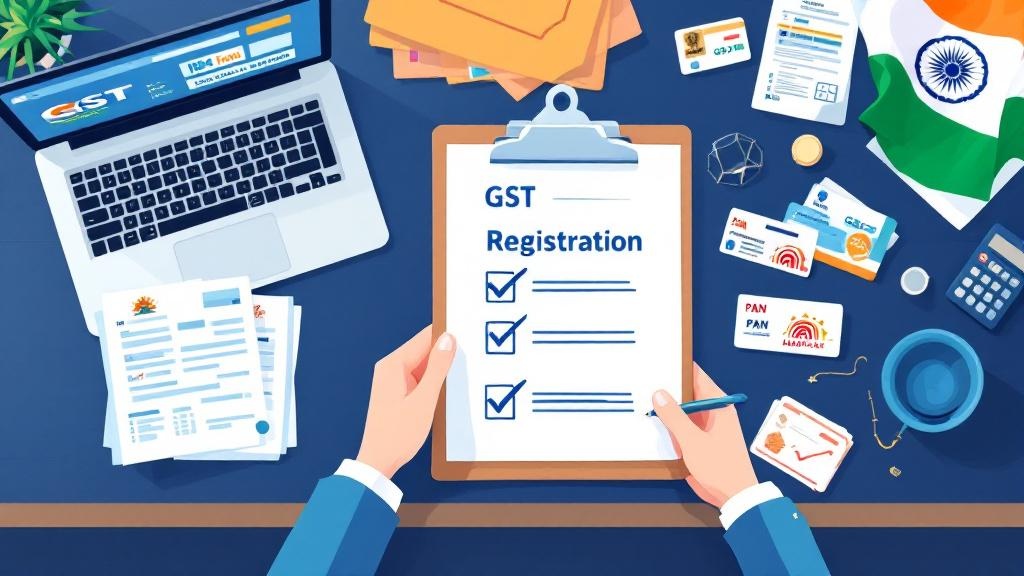The Goods and Services Tax (GST) has revolutionized the way businesses operate in India by introducing a unified tax structure across the country. Whether you’re a small business owner, a freelancer, or running a large corporation, understanding the GST registration eligibility is essential for ensuring compliance and optimizing your tax liabilities.
However, did you know that GST registration eligibility isn’t one-size-fits-all? It varies significantly based on the type of business you run. In this blog post, we’ll break down how GST registration applies to different types of businesses, helping you understand when you need to register and why it’s crucial for your operations.
What is GST Registration?
Before diving into the specifics of eligibility, let’s quickly define what GST registration means. Simply put, GST registration is a process where a business gets itself recognized under the Goods and Services Tax system. Once registered, businesses are required to collect tax on behalf of the government, file regular returns, and fulfill other statutory obligations.
When you’re registered for GST, you can also avail of input tax credit (ITC), which means you can offset the tax paid on business inputs against the tax collected on your sales. For businesses, this can result in significant savings.
Why Is GST Registration Important?
-
Legal Requirement: If your turnover crosses the prescribed limit, GST registration becomes a mandatory legal requirement.
-
Compliance: Staying compliant with GST regulations helps avoid penalties and legal issues.
-
Input Tax Credit: Registered businesses can reclaim tax paid on inputs, reducing overall costs.
-
Trustworthiness: GST registration adds credibility to your business and helps in smoother dealings with suppliers, clients, and government authorities.
Now, let’s look at how GST registration eligibility varies based on your business type.
1. GST Registration for Sole Proprietorship
Sole proprietors are individual business owners who manage everything on their own. Sole proprietorships are one of the most common forms of business in India, especially for small businesses.
When is GST Registration Required for Sole Proprietorships?
-
Turnover Limit: If your annual turnover exceeds ₹40 Lakhs (₹20 Lakhs for Special Category States), you must apply for GST registration.
-
Interstate Supply: Even if the turnover is below the threshold, you must register for GST if you are engaged in interstate supply of goods or services.
Sole proprietors can opt for voluntary registration if they wish to claim input tax credits or build a more professional image.
2. GST Registration for Partnerships
Partnerships are another common business structure where two or more individuals share ownership of the business. Unlike sole proprietorships, partnerships typically manage larger operations, which can impact GST registration eligibility.
When is GST Registration Required for Partnerships?
-
Turnover Limit: If your partnership firm’s turnover exceeds ₹40 Lakhs (₹20 Lakhs for Special Category States), GST registration is mandatory.
-
Interstate Supply: Even if the turnover is below the limit, GST registration is required if the partnership firm engages in interstate trade.
A partnership firm can also opt for voluntary registration if it sees business advantages in claiming ITC and improving credibility.
3. GST Registration for Limited Liability Partnerships (LLPs)
Limited Liability Partnerships (LLPs) combine the flexibility of a partnership with the protection of limited liability. GST registration for LLPs follows a similar process to partnerships, but certain nuances exist based on the structure.
When is GST Registration Required for LLPs?
-
Turnover Limit: Just like partnerships, an LLP must register for GST if its turnover exceeds ₹40 Lakhs (₹20 Lakhs for Special Category States).
-
Interstate Supply: If your LLP makes interstate supplies, even if the turnover is below the threshold, GST registration is compulsory.
LLPs may also register voluntarily for the ability to offset input taxes and enhance business credibility.
4. GST Registration for Corporations and Companies
Corporations and companies (both private and public) usually have more complex operations and higher turnovers compared to smaller businesses. As a result, GST registration is often mandatory.
When is GST Registration Required for Corporations?
-
Turnover Limit: Corporations with a turnover exceeding ₹40 Lakhs (₹20 Lakhs for Special Category States) are obligated to register under GST.
-
Interstate Supply: If your corporation is involved in interstate supply, GST registration is mandatory, even if the turnover is below the prescribed limit.
Unlike smaller businesses, most corporations need to register for GST even if their turnover is just slightly above the threshold. This is due to their nature of business, which often involves interstate or international dealings.
5. GST Registration for E-Commerce Businesses
The rise of e-commerce has transformed the business landscape in India. With platforms like Amazon, Flipkart, and independent e-commerce websites flourishing, e-commerce businesses face specific GST registration requirements.
When is GST Registration Required for E-Commerce Businesses?
-
Interstate Supply: E-commerce businesses that make interstate supplies must register for GST, regardless of turnover.
-
Turnover Limit: E-commerce operators whose turnover exceeds ₹40 Lakhs (₹20 Lakhs for Special Category States) are required to register for GST.
-
E-commerce Operators: If you are operating an e-commerce platform, even if you don’t directly sell goods, you need to register for GST to ensure tax compliance and facilitate the collection of taxes on behalf of vendors.
E-commerce businesses have additional rules to follow and need to ensure GST compliance for smooth operations.
6. GST Registration for Service Providers
For businesses that primarily offer services (like consultants, software developers, and advertising agencies), the GST registration criteria are slightly different.
When is GST Registration Required for Service Providers?
-
Turnover Limit: Service providers need to register for GST if their turnover exceeds ₹20 Lakhs (₹10 Lakhs for Special Category States).
-
Interstate Service: If you provide services across state lines, GST registration is required, even if your turnover falls below the threshold.
Service providers may find voluntary registration beneficial if they want to claim input tax credits or improve their professional image.
7. GST Registration for Importers and Exporters
If you are involved in importing or exporting goods or services, GST registration requirements can be different. Importers and exporters need to comply with GST rules to ensure proper documentation and avoid penalties.
When is GST Registration Required for Importers and Exporters?
-
Importers: GST registration is mandatory for businesses involved in importing goods or services, irrespective of their turnover.
-
Exporters: Exporters are exempt from paying GST on exports (zero-rated), but they still need to register for GST to claim refunds on input taxes paid on exported goods or services.
Many exporters also register for GST to avoid delays in their business processes and facilitate smoother cross-border transactions.
Conclusion
Navigating GST registration eligibility can be a bit tricky, especially when considering the various business types and their unique requirements. Whether you’re a sole proprietor, partnership, LLP, corporation, or service provider, understanding the rules will help you avoid costly mistakes and ensure smooth operations.
For businesses with complex requirements or those unsure about how to proceed, professional guidance can be invaluable. At FinTax24, we specialize in providing businesses with the expertise they need for GST registration, compliance, and tax planning.
By registering for GST on time, you’ll not only stay compliant but also open doors to many benefits such as input tax credits and enhanced business credibility. Whether your business is small or large, GST registration can boost your financial efficiency and legal standing in the marketplace.
If you have any questions about GST registration eligibility or need professional assistance, feel free to reach out to experts at FinTax24.







Comments (0)